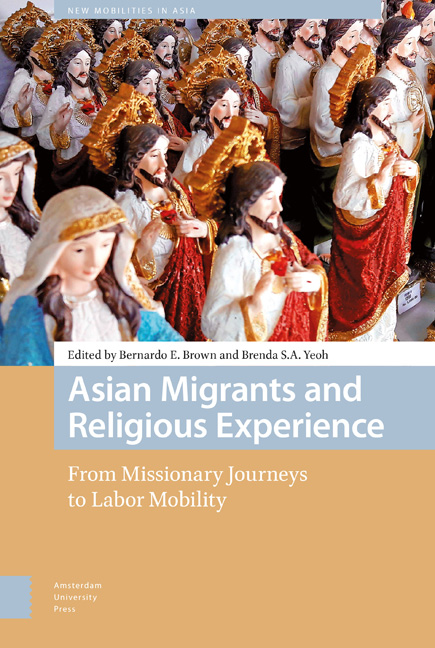Book contents
- Frontmatter
- Contents
- List of Illustrations
- Acknowledgments
- 1 Introduction: Human Mobility as Engine of Religious Change
- Section 1 Mobile Religious Practices
- 2 Saving Yogis: Spiritual Nationalism and the Proselytizing Missions of Global Yoga
- 3 Renewed Flows of Ritual Knowledge and Ritual Affect within Transnational Networks: A Case Study of Three Ritual Events of the Xinghua (Henghua) Communities in Singapore
- 4 Liberalizing the Boundaries: Reconfiguration of Religious Beliefs and Practice amongst Sri Lankan Immigrants in Australia
- Section 2 Transnational Proselytizing
- 5 From Structural Separation to Religious Incorporation: A Case Study of a Transnational Buddhist Group in Shanghai, China
- 6 “10/40 Window”: Naga Missionaries as Spiritual Migrants and the Asian Experience
- 7 Religion, Masculinity, and Transnational Mobility: Migrant Catholic Men and the Politics of Evangelization
- 8 Helping the Wounded as Religious Experience: The Free Burma Rangers in Karen State, Myanmar
- Section 3 Refashioning Religiosity in the Diaspora
- 9 A Multicultural Church: Notes on Sri Lankan Transnational Workers and the Migrant Chaplaincy in Italy
- 10 “Bahala Na Ang Diyos”: The Paradox of Empowerment among Filipino Catholic Migrants in South Korea
- 11 Feeling Hindu: The Devotional Sivaist Esthetic Matrix and the Creation of a Diasporic Hinduism in North Sumatra
- 12 Afterword: What Makes Asian Migrants’ Religious Experience Asian?
- References
- Index
8 - Helping the Wounded as Religious Experience: The Free Burma Rangers in Karen State, Myanmar
Published online by Cambridge University Press: 12 December 2020
- Frontmatter
- Contents
- List of Illustrations
- Acknowledgments
- 1 Introduction: Human Mobility as Engine of Religious Change
- Section 1 Mobile Religious Practices
- 2 Saving Yogis: Spiritual Nationalism and the Proselytizing Missions of Global Yoga
- 3 Renewed Flows of Ritual Knowledge and Ritual Affect within Transnational Networks: A Case Study of Three Ritual Events of the Xinghua (Henghua) Communities in Singapore
- 4 Liberalizing the Boundaries: Reconfiguration of Religious Beliefs and Practice amongst Sri Lankan Immigrants in Australia
- Section 2 Transnational Proselytizing
- 5 From Structural Separation to Religious Incorporation: A Case Study of a Transnational Buddhist Group in Shanghai, China
- 6 “10/40 Window”: Naga Missionaries as Spiritual Migrants and the Asian Experience
- 7 Religion, Masculinity, and Transnational Mobility: Migrant Catholic Men and the Politics of Evangelization
- 8 Helping the Wounded as Religious Experience: The Free Burma Rangers in Karen State, Myanmar
- Section 3 Refashioning Religiosity in the Diaspora
- 9 A Multicultural Church: Notes on Sri Lankan Transnational Workers and the Migrant Chaplaincy in Italy
- 10 “Bahala Na Ang Diyos”: The Paradox of Empowerment among Filipino Catholic Migrants in South Korea
- 11 Feeling Hindu: The Devotional Sivaist Esthetic Matrix and the Creation of a Diasporic Hinduism in North Sumatra
- 12 Afterword: What Makes Asian Migrants’ Religious Experience Asian?
- References
- Index
Summary
Abstract
Building on ethnographic fieldwork on humanitarian cultures since 2007 in Karen state, eastern Myanmar, this chapter examines the vastly expanded mobility of displaced Karen villagers in the evangelical humanitarian movement Free Burma Rangers in the Thai-Burmese borderlands. While refugees are too often presented in literature as victims, I argue that by joining the mission, the Karen freedom fighters become ambassadors of a political ideology and evangelism. Bringing Christianity with them from their homes, displaced Karen meet the evangelical humanitarian organization at the Thai refugee camps, train with them, and supply the villagers left behind with emergency healthcare and religious messages. Funded by American free churches, the US military, and resettled Karen communities in the West, the freedom fighters of the Free Burma Rangers mobilize people and resources all over the globe and expand their operations to the Kurdish areas of Syria and the Nuban mountains of South Sudan.
Keywords: Karen state, refugees, Free Burma Rangers, humanitarianism, Mission
Introduction
The intersection between migration, religion, and globalization is among the most exciting debates in current migration studies (Csordas 2009). In ourrecent publication, Building Noah's Ark (Horstmann & Jung 2015), we follow up on the work by Mark Johnson & Pnina Werbner (2010), Aihwa Ong (2003), Peggy Levitt (2007) and Pnina Werbner (2003) to illustrate the centrality of religion in strategies of emplacement and navigation. Religion, we argue, is a lens for understanding the efforts that are invested in transforming strange and hostile environments into more docile and peaceful ones. Religion can be seen as a privileged site through which to study agency, making losses more bearable and reconstructing lives more comfortable. In writing about religion and motion, I have been inspired by Thomas Tweed. In Tweed's opinion, religion is intimately linked to involuntary mobility: it assists in crossing boundaries and is part of a process of reconstructing the self and reimagining the community (2006). From this perspective, Karen villagers, whose homes have been violently displaced in the protracted conflict in eastern Myanmar, are becoming mobile subjects against their will. Bringing religion with them as cultural baggage, they act as missionaries of some sort, mobilizing throughout Myanmar, Thailand, and the West, to spread the good news of Karen Christianity if they are Christian, or to reconstruct Karen monasteries in political exile if they are Buddhist.
- Type
- Chapter
- Information
- Asian Migrants and Religious ExperienceFrom Missionary Journeys to Labor Mobility, pp. 201 - 218Publisher: Amsterdam University PressPrint publication year: 2018



